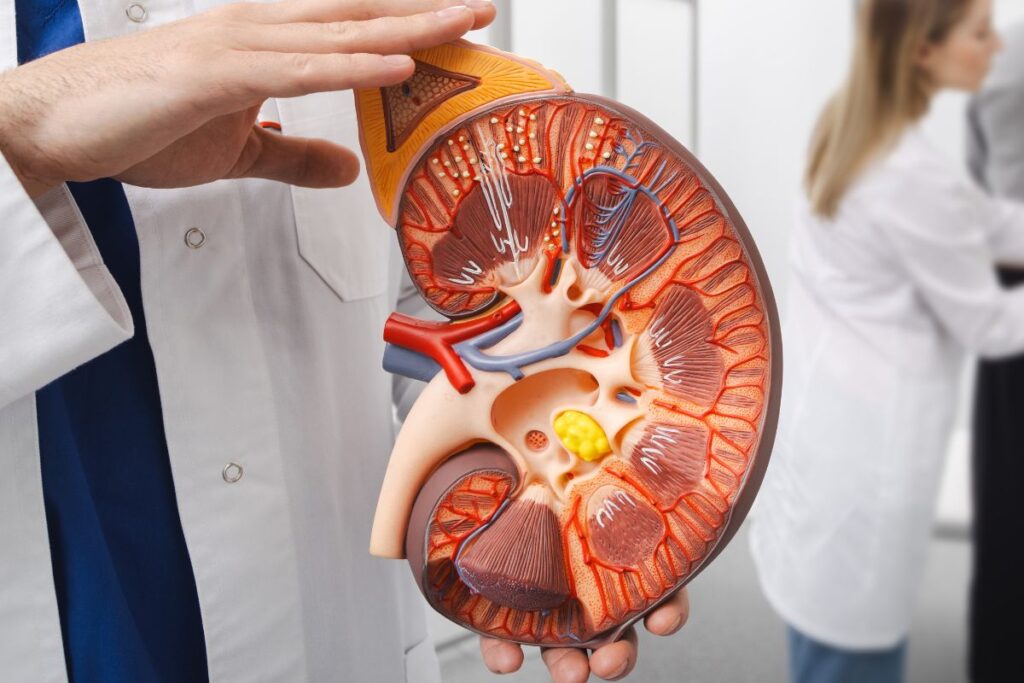Kidney transplant treatment in India has seen remarkable growth, with the country now performing over 13,000 kidney transplants annually, making it one of the leading transplant destinations in the world. With higher success rates and treatment costs significantly lower than in the US or UK, India offers a powerful combination of expertise, affordability, and advanced medical infrastructure.
From modern transplant centers to highly experienced nephrologists and internationally trained surgeons, India provides comprehensive care for patients with end-stage kidney disease. Whether you want to understand the kidney transplant procedure, compare kidney transplant costs in India, navigate the kidney donor process, or choose the best kidney transplant hospitals, this guide presents everything in a clear, simplified manner.

Table of Contents
1. What Is a Kidney Transplant?
A kidney transplant is a surgical procedure in which a healthy donor kidney is placed into a patient whose kidneys have permanently lost their ability to function. It is one of the most effective treatments for End-Stage Renal Disease (ESRD) and advanced Chronic Kidney Disease (CKD Stage 5), where dialysis alone is no longer sufficient for long-term survival or quality of life.
Unlike dialysis, which only temporarily filters blood, a kidney transplant restores normal kidney function, offering better survival rates, improved quality of life, fewer dietary restrictions, and long-term cost savings.
Kidney Transplants Treatment in India are performed using strict medical, ethical, and legal protocols under the Transplantation of Human Organs and Tissues Act (THOTA). Most transplants come from either a living donor (usually a close relative) or a deceased/cadaveric donor.
A successful kidney transplant can last 15–20 years or more, depending on immunosuppressive care, lifestyle, and organ compatibility.
Who is Eligible for a Kidney Transplant Treatment in India?
Patients are considered eligible for a kidney transplant if they have end-stage renal disease (ESRD), irreversible kidney failure, or require long-term dialysis. Eligibility depends on medical fitness, absence of active infections, controlled comorbidities, and approval from a transplant evaluation committee under THOTA guidelines.
2. Types of Kidney Transplants in India
There are various types of kidney transplant treatments in India, depending on donor availability, medical eligibility, and organ compatibility. Understanding these options helps patients choose the safest and most suitable treatment plan.
2.1 Living Donor Kidney Transplant
A living donor, usually a close blood relative such as a parent, sibling, or spouse, donates one of their healthy kidneys.
- Most common type in India
- High success rates due to better tissue matching
- Faster transplant process
Living donor evaluations include blood tests, tissue typing, cross-matching, and full medical screening to ensure the kidney donor process is safe for both donor and recipient.
2.2 Deceased Donor (Cadaveric) Kidney Transplant
Organs are donated by individuals who have been declared brain-dead and registered under government-authorized organ donation programs like NOTTO and SOTTO.
- Longer waiting period
- Suitable for patients without eligible living donors
- Success rates comparable to living donor transplants
2.3 ABO-Incompatible Kidney Transplant
This is for patients whose blood type does not match their donor’s blood group.
- Requires special medical preparation, such as antibody removal
- Widens donor possibilities
- Slightly higher cost due to added procedures
2.4 Paired Kidney Exchange (Swap Transplant)
Two families exchange donors when their own donor-recipient pairs are incompatible.
- Legally approved under THOTA
- Allows more patients to receive a compatible kidney
- Increasingly common in India

3. Kidney Transplant Procedure in India (Step-by-Step)
The process of kidney transplant treatment in India involves several medical, legal, and logistical steps to ensure safety, compatibility, and long-term success. Here’s a simple breakdown of how the procedure works from evaluation to recovery.
3.1 Pre-Transplant Evaluation
Before surgery, both the patient and donor undergo detailed medical screening to confirm eligibility.
Recipient Evaluation Includes:
- Blood tests, kidney function tests
- Tissue typing (HLA typing)
- Crossmatch testing
- ECG, chest X-ray, cardiac evaluation
- Infection screening (HIV, Hepatitis B/C, TB)
- Psychological and nutritional assessment
Donor Evaluation Includes:
- Full physical exam
- Renal function tests
- CT angiography of the kidneys
- Compatibility testing
- Risk assessment
The objective is to ensure the donor is healthy and the recipient is medically fit to undergo the transplant.
3.2 Kidney Donor Process (India Requirements)
The kidney donor process in India is regulated under the Transplantation of Human Organs and Tissues Act (THOTA).
Who Can Donate?
- Close relatives (parent, sibling, spouse, child)
- Non-related donors (requires authorization committee approval)
- Deceased donors (brain-dead, registered under NOTTO/SOTTO)
Documentation Required:
- Identity proof
- Relationship proof (for related donors)
- Medical reports
- Affidavit & consent forms
- Committee approval (for unrelated donors)
This step ensures legality, safety, and ethical standards.
3.3 The Kidney Transplant Surgery
A kidney transplant surgery typically lasts 3–4 hours.
Procedure Steps:
- The patient is placed under general anesthesia.
- A small incision is made in the lower abdomen.
- The donor kidney is placed in the pelvic region.
- Blood vessels of the new kidney are connected to the patient’s vessels.
- The ureter is connected to the bladder for urine flow.
- The old kidneys are usually not removed unless infected or enlarged.
The new kidney starts functioning immediately for many patients, while others may need short-term dialysis.
3.4 Post-Transplant Care
The immediate post-surgery period is crucial for successful recovery.
First 1–2 Weeks (Hospital Stay):
- ICU monitoring for 24–48 hours
- Kidney function checks
- Fluid/electrolyte management
- Ultrasound to check graft function
- Start of immunosuppressive medications
After Discharge:
- Frequent follow-ups (weekly for the first month, then monthly)
- Strict medication adherence
- Routine blood tests to monitor creatinine and organ rejection
- Infection prevention measures

4. What is the Cost of Kidney Transplant Surgery in India?
The average kidney transplant cost in India ranges from ₹5 lakh to ₹15 lakh in 2025.
This includes:
- Pre-transplant tests
- Donor evaluation
- Surgery for both the donor (if living) and the recipient
- Hospital stay (ICU + ward)
- Medications during admission
- Surgical consumable
4.1 Detailed Cost Breakdown
| Cost Component | Estimated Cost (₹) | What it Includes |
| Pre-Transplant Evaluation | ₹30,000 – ₹1,00,000 | Blood tests, HLA typing, crossmatch, cardiac evaluation, imaging, infection screening |
| Kidney Transplant Surgery | ₹5,00,000 – ₹15,00,000 | Operation charges, surgeon fees, donor surgery (if living), ICU stay, ward stay, consumables |
| Post Operative Care | ₹1,00,000 – ₹3,00,000 | ICU monitoring, medications during hospital stay, graft function tests, follow-up imaging |
| Immunosuppressant Medications | ₹50,000 – ₹2,00,000 annually | Anti-rejection drugs, antibiotics, and supportive medications |
| Additional Test and Follow-ups | ₹10,000 – ₹50,000 annually | Routine tests and monitoring |
4.2 Factors Affecting Kidney Transplant Cost in India
The cost of a renal transplant may increase or decrease based on:
1. Type of Hospital
- Government hospitals: Lowest cost
- Corporate private hospitals: Higher cost due to advanced infrastructure
- JCI/NABH accredited transplant centers: Mid to high range
2. Type of Donor
- Living donor: Additional donor surgery + testing
- Deceased donor: Registration + waitlist costs
- ABO-incompatible transplant: Higher due to antibody removal procedures
3. Medical Complexity
- Comorbidities (diabetes, cardiac issues)
- Prolonged ICU stay
- Unexpected complications
4. Post-Transplant Medication
Immunosuppressive drugs cost ₹10,000–20,000 per month, depending on prescription.
4.3 Kidney Transplant Cost Comparison by City (2025)
| City | Kidney Transplant Cost (₹) |
| Delhi | ₹10.5 lakh – ₹11.5 lakh |
| Mumbai | ₹7.5 lakh – ₹8.5 lakh |
| Chennai | ₹4.75 lakh – ₹7.3 lakh |
| Bangalore | ₹7.5 lakh – ₹10.5 lakh |
| Hyderabad | ₹5 lakh – ₹15 lakh |
| Pune | ₹4 lakh – ₹10 lakh |
| Kolkata | ₹5 lakh – ₹11 lakh |
| Noida | ₹5 lakh – ₹12 lakh |
| Gurgaon | ₹7.5 lakh – ₹9.5 lakh |
| Ahmedabad | ₹5.64 lakh – ₹11.3 lakh |
5. Top 5 Kidney Transplant Hospitals in India
Here are five of the leading hospitals for kidney transplant treatment in India, selected for their experience, infrastructure, success rates, and patient support.
1. Max Super Speciality Hospital, Saket, New Delhi
Max Hospital is recognised for performing complex kidney transplants, including ABO-incompatible transplants, with a dedicated transplant ICU and multi-disciplinary team of nephrologists and transplant surgeons.
2. Kokilaben Dhirubhai Ambani Hospital, Mumbai
The hospital is ranked among India’s top private kidney transplant hospitals, with a strong kidney transplant programme, full-time transplant specialists, advanced diagnostics, and high international patient service standards.
3. Indraprastha Apollo Hospitals, New Delhi
Indraprastha, Apollo Hospital is one of the first hospitals to perform organ transplants in India. It offers comprehensive kidney transplant care from donor evaluation to long-term follow-up, backed by advanced infrastructure and accredited programs.
4. Gleneagles Global Hospital, Mumbai
Gleneagles is well known for high-quality organ transplant services, patient-centred care, and modern facilities that support both living and deceased donor transplants with international quality standards.
5. Fortis Healthcare (Multisite, Eg, Mulund)
Fortis offers comprehensive kidney transplant services, pre-transplant evaluation, surgery, and post-operative care, with reliable outcomes and global patient services.
Help others access timely medical care.
Refer them to ImpactGuru and support their fundraising journey.
Join ImpactGuru’s Referrals Program Now !
Conclusion
A kidney transplant treatment in India offers the best long-term outcome for patients with end-stage renal disease, providing improved survival, better quality of life, and independence from dialysis. With expert transplant teams, advanced medical facilities, and strict legal protocols, India has become one of the most reliable and affordable destinations for kidney transplant treatment.
This guide equips patients and families with essential information on procedure steps, donor requirements, transplant costs, and how to choose the right hospital, helping them make confident and informed decisions.
Yet, despite India’s comparatively lower costs, many families still struggle to afford treatment. ImpactGuru bridges this gap by enabling patients to raise funds quickly and transparently through medical crowdfunding, ensuring timely access to life-saving care.
FAQs
The cost typically ranges between ₹5 lakh and ₹15 lakh, depending on the hospital, donor type, and post-op care.
Key factors include whether the hospital is public or private, living vs deceased donor, complexity of the case, and long-term immunosuppressant medication.
Most patients recover physically over 1–2 months, though monitoring and medications continue for life.












